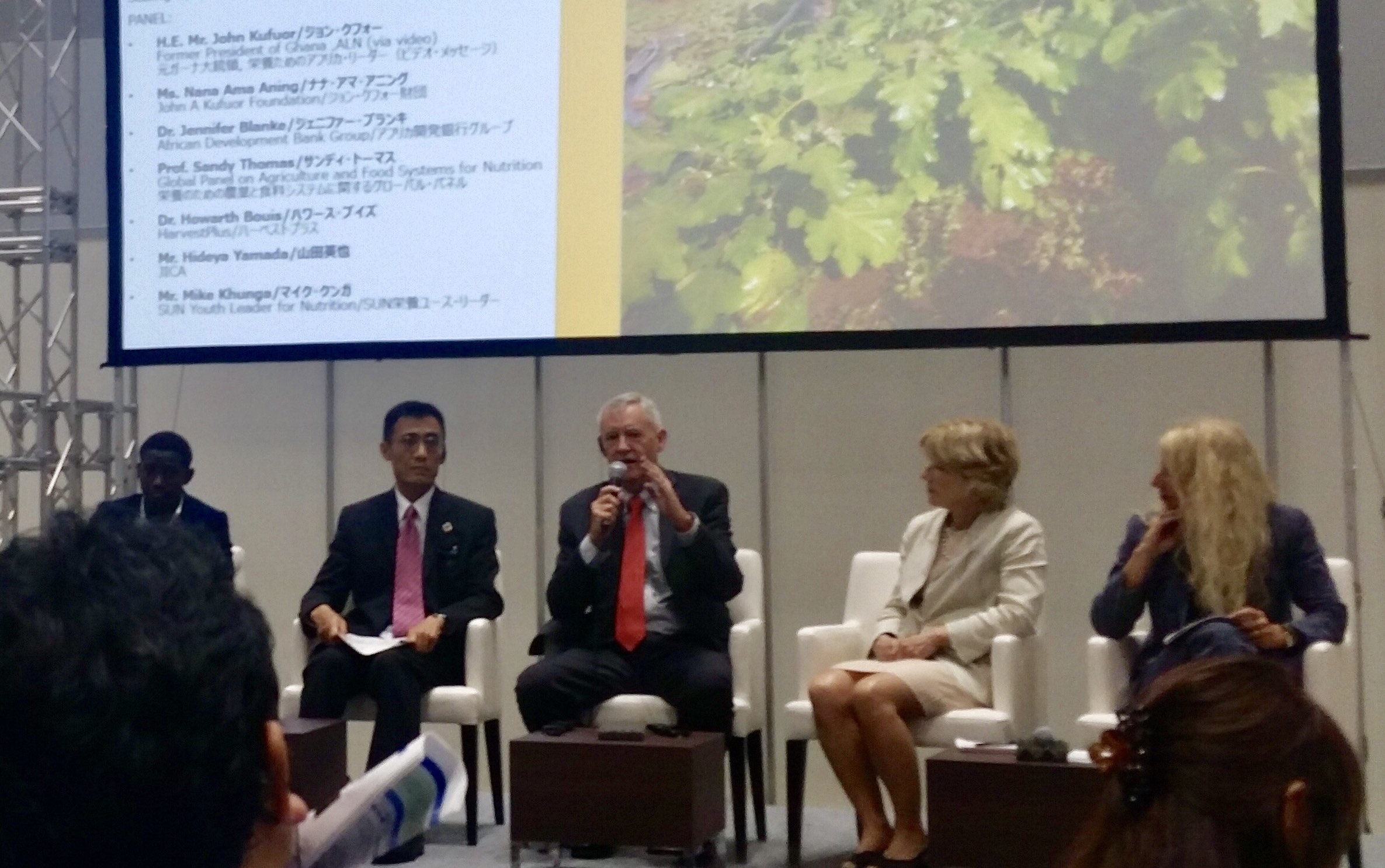To feed its growing population amid climate change and other challenges, Africa needs a flourishing food system that is nutrition-sensitive, efficient, safe, healthy, and environmentally sustainable. This requires bringing modern technologies to local communities, helping stakeholders to acquire the relevant technical know-how, and building strong partnerships and institutions. Developed countries around the world can play important roles in these efforts—and Japan is one of them.
An IFPRI side event in Yokohama at the Tokyo International Conference on African Development (TICAD7) in August explored how Japan is lending its expertise to address Africa’s food and nutrition challenges.
“There are only two countries in the world that have no hunger and no problem of rising overweight. One of them is Japan. So, Japan is possibly in the best position to help other countries solve their food security and nutrition problems,” said IFPRI Markets, Trade and Institutions Division Director Rob Vos. IFPRI’s new research program Food Industries for People and Planet (FIPP) is also relevant in this regard.
Presentations focused on Japan’s agri-food know-how and its applications in Africa. In Senegal, for example, Kagome, one of Japan’s leading vegetable companies, has been producing tomatoes, which have become an increasingly popular food item and an important source of vegetable-derived micronutrients. The Kagome operation has doubled the typical tomato yield in Senegal, saves water by employing drip irrigation, and has boosted local employment. Likewise, the Japan International Cooperation Agency (JICA)’s Smallholder Horticulture Empowerment and Promotion (SHEP) approach stresses the importance of educating farmers to understand market mechanisms and make the optimal planting and marketing decisions.
The Ajinomoto Foundation has developed KOKO-Plus, a low-cost micronutrient supplement with a long shelf-life that supports child nutrition and growth during the weaning period. Their recent experience in Ghana shows that an effective public-private-partnership is key for establishing a working business model and scaling up for this type of product; the public sector can provide knowledge and understanding about child nutrition, while the private sector can support efficient production and supply.
Japanese know-how—such as processing fish products into a versatile paste called surimi—is another success story in Africa. The introduction of surimi improves nutrition intake, especially in protein, and reduces food lossproviding income to fishing villages and employing women, contributing to women’s empowerment, as demonstrated by NPO Uminokuni Japan.
Japan’s school lunch program is a good example of institutional innovations, which emphasize the importance of child nutrition.
Japanese advanced solar panel and refrigeration technologies have been key to ColdHubs, a Nigerian startup that operates solar-powered cold-storage facilities across the country and has helped reduce food loss and waste by lengthening the life of perishable food items in rural areas. External knowledge, technology and financial investment is crucial for scaling up such enterprises and providing more nutrient-rich food to local populations.
At another side event, GGG+ Forum organized by Results Japan, Howarth Bouis, founder of HarvestPlus (based at IFPRI), spoke on the importance of biofortification.
“Biofortification of staple foods has been proven very cost-effective and sustainable in reducing micronutrient deficiency in developing countries and needs to be scaled up,” he said. While the prices of staple crops such as grains have fallen over time, Bouis noted, the prices of other nutrient-rich food items have been rising and remain high in developing countries. It’s crucial to increase investments that lead to lower prices of nutrient-rich products such as eggs, meat, and horticulture products, he said, and Japan’s leadership in these efforts is essential.
Strengthening the collaborations between Japan and the international community, project implementers, and research organizations like IFPRI, and fostering public-private-partnerships, is essential, said Masahito Enomoto, former JICA vice president for Food, Agriculture and Nutrition. These joint efforts, he said, will also be crucial for the Global Nutrition Summit to be held in Japan in 2020 and beyond.
Hiroyuki Takeshima is a Senior Research Fellow with IFPRI’s Development Strategy and Governance Division; Futoshi Yamauchi is a Senior Research Fellow with IFPRI’s Market’s Trade and Institutions Division (MTID); Swati Malhotra is an MTID Communications Specialist.







